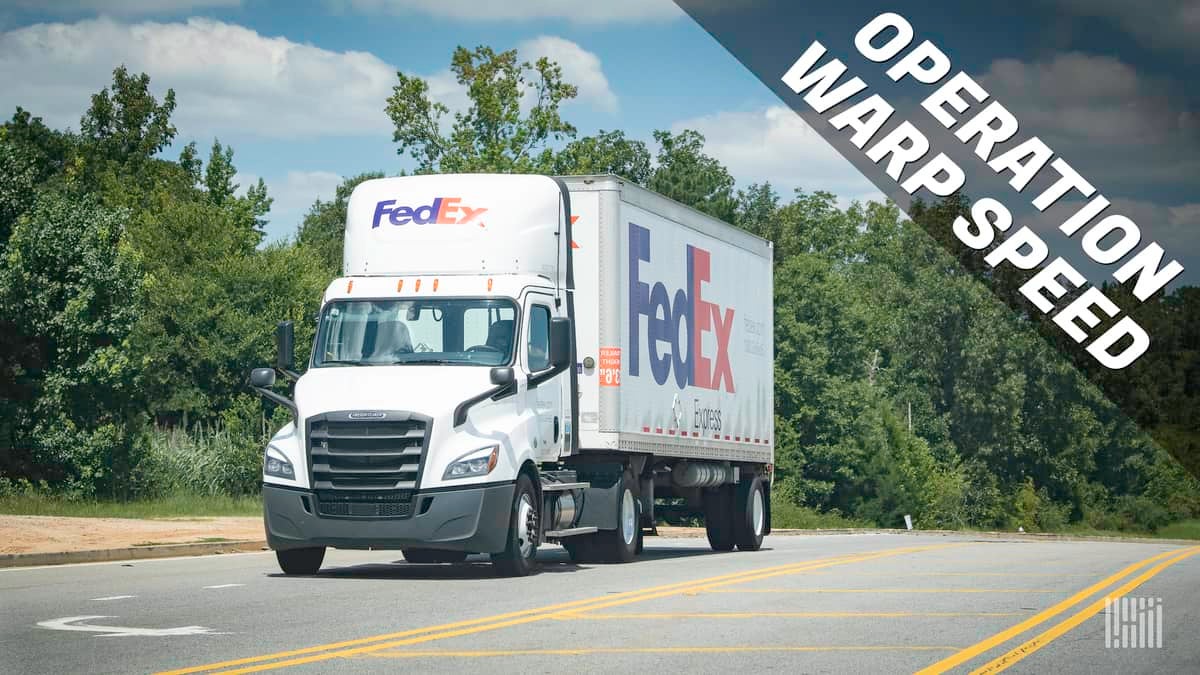FedEx Express (NYSE: FDX) and UPS (NYSE: UPS) trucks departed Pfizer Inc.’s (NYSE: PFE) sprawling manufacturing facility in Portage, Michigan, on Sunday morning loaded with COVID-19 vaccines packed in dry ice to maintain them at ultra-cold temperatures.
The express delivery companies have roughly divided the nation in two, with FedEx supplying the western states and UPS those in the east, based on plans developed in coordination with the federal government’s Operation Warp Speed.
State-designated distribution sites in the region will receive direct truck deliveries. Other trucks and aircraft will head to the FedEx and UPS air hubs in Memphis, Tennessee, and Louisville, Kentucky, where shipments will be put on planes for nationwide distribution.
“We expect 145 sites across all the states to receive the vaccine on Monday,” Army General Gus Perna, the chief operations officer for Operation Warp Speed (OWS), said in a press conference Saturday. “Another 425 sites on Tuesday and the final 66 sites on Wednesday, which will complete the initial delivery of the Pfizer orders for the vaccine.”
The Pfizer boxes are packed with about 50 pounds of dry ice to keep the vaccine stable at minus 70 degrees Celsius. UPS is not using refrigerated trucks, relying on the dry ice to maintain the required temperature. News footage from the Pfizer plant Sunday morning showed a refrigerated FedEx truck waiting to be loaded.
A FedEx Express cargo plane left Gerald R. Ford International Airport in Grand Rapids, Michigan, at 11 a.m. Sunday on a regularly scheduled flight headed to Memphis with one of the first shipments of vaccine, airport spokesman Stephen Clark said.
The Airbus A300 aircraft made the flight in 90 minutes.
The Ford airport is the closest commercial airport to Pfizer’s plant near Kalamazoo.
FedEx operates a facility at the Grand Rapids airport and will likely handle vaccine shipments on an ongoing basis for the foreseeable future.
FedEx Express is the corporate unit that handles time-definite shipments. It is transporting vaccines with support from the FedEx Custom Critical team. FedEx Ground will continue to focus on retail and business package deliveries.
The Food and Drug Administration late Friday issued an emergency use authorization for the Pfizer/BioNTech vaccine, putting into motion the largest logistical effort in modern history to immunize 7.8 billion people worldwide as quickly as possible.
Operation Warp Speed has allotted 6.4 million doses of Pfizer vaccine for initial distribution, based on availability. The express carriers will deliver 2.9 million doses this week and another 2.9 million doses in a couple of weeks. OWS is holding back 500,000 doses as a backup for emergency contingencies.
The Pfizer vaccine requires two doses taken 17 to 21 days apart for maximum effectiveness. Frontline medical workers and nursing home staff and residents are expected to get the first treatments.
Click here for more FreightWaves/American Shipper stories by Eric Kulisch.
RELATED NEWS:
FedEx, UPS activate delivery networks after FDA approves Pfizer vaccine
Freight interests, pilots press for priority vaccinations
Truck drivers on list for potential COVID-19 vaccine priority
Truck safety groups caution against exemptions on hauling vaccines











Bobbi Schaus
This is very exciting news. Thank you President Trump and thank you Operation Warp Speed. It is wonderful to have these private companies moving ahead in a coordinated way. Keep up the great work!!!
Sandy Williams
Thank you President TRUMP, Thank you Operation Warp Speed, Thank you Truckers!!!
Job well planned out in advance!
Stephen Webster
This is good work together to get to medical workers first. This very important to get the economy going again.